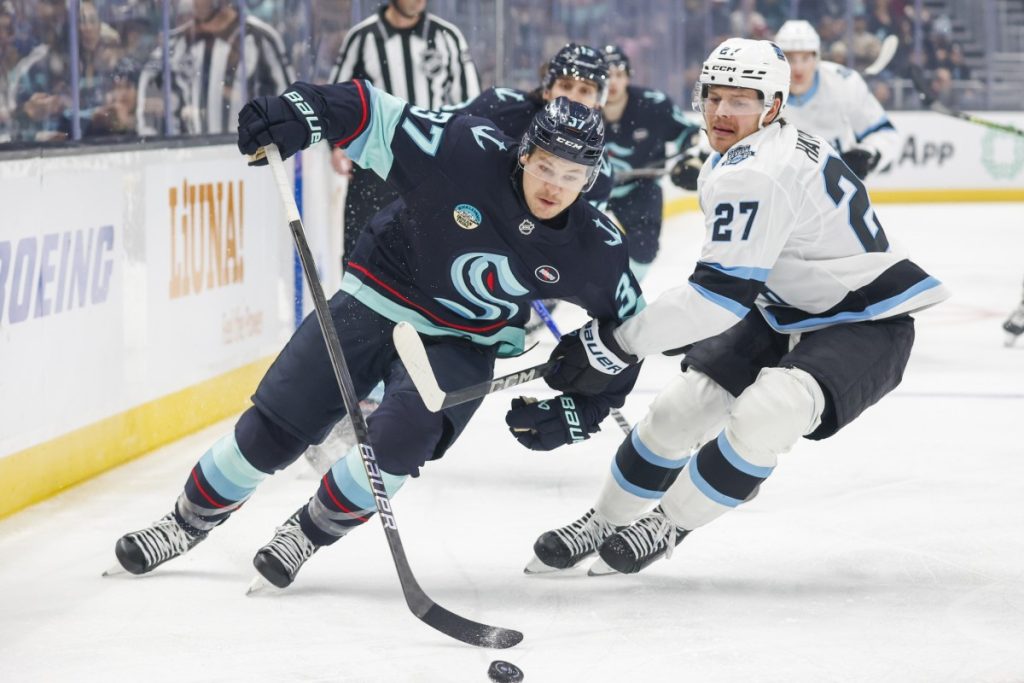Eastern Conference: A Tight Wild-Card Race
The NHL’s playoff race in the Eastern Conference is as competitive as ever, with just over three weeks until the March 7 trade deadline. Seven teams are within six points of the Detroit Red Wings, who currently hold the second wild-card spot. The Buffalo Sabres, sitting 12 points behind Detroit, are virtually out of contention. However, the Boston Bruins, Columbus Blue Jackets, New York Rangers, and New York Islanders are all within four points of the Red Wings. This tight race means that almost any team in the East could find themselves in a playoff position if they can string together a few wins post-4 Nations Face-Off break. The Pittsburgh Penguins have started their selling spree by trading Marcus Pettersson to the Vancouver Canucks, but it remains to be seen if they will move other players like Rickard Rakell. The fluid nature of the wild-card spots in the East makes it difficult for General Managers to decide whether to be buyers or sellers. With so many teams having a plausible shot at the playoffs, the decision to trade can be influenced by short-term performances and strategic considerations.
Western Conference: A More Defined Picture
In stark contrast, the Western Conference has a clearer picture when it comes to playoff contention. Five teams—the San Jose Sharks, Chicago Blackhawks, Nashville Predators, Seattle Kraken, and Anaheim Ducks—are at least nine points behind the Vancouver Canucks, who occupy the second wild-card spot. Two additional teams, the St. Louis Blues and Utah Hockey Club, are at least six points behind Vancouver. The only team within reach is the Calgary Flames, who are just three points behind the Canucks. This wider gap between the contenders and those out of contention suggests that more Western Conference teams might be inclined to become sellers. The lack of a clear playoff path for many of these teams could lead to significant roster changes and the movement of key players before the deadline.
Key Trade Candidates in the West
Given the more defined playoff picture in the West, several players have emerged as potential trade candidates. The Chicago Blackhawks’ center Ryan Donato is one such name. Donato, a skilled forward with the ability to contribute offensively, could be an attractive asset for a team looking to bolster its forward line. The San Jose Sharks’ defenseman Mario Ferraro has also surfaced on trade boards. Ferraro’s versatility and defensive capabilities make him a valuable player for teams in need of defensive depth. Another notable name is John Gibson, the goaltender for the Anaheim Ducks. While Gibson is a top talent, any deal involving him would likely require Anaheim to retain a portion of his salary to make it financially feasible for the acquiring team.
Predators’ Potential Moves
The Nashville Predators are another team that could see significant changes before the deadline. Veteran forwards Ryan O’Reilly and Gustav Nyquist have been mentioned in trade rumors. O’Reilly, a seasoned center with leadership qualities, and Nyquist, a reliable wing with offensive flair, could both be attractive options for playoff-bound teams. The right circumstances could lead to their departure from Nashville, providing the Predators with valuable assets in return. Trade discussions for these players will likely intensify as the deadline approaches, and Nashville’s GM may find it prudent to make moves to improve the team’s future prospects.
Kraken and Blues: Evaluating Their Options
The Seattle Kraken, a newer franchise, might also explore the trade market to make strategic moves. Veteran forwards Yanni Gourde and Brandon Tanev are potential trade candidates. Gourde, known for his offensive contributions and two-way play, could be a valuable addition for a team in need of depth. Tanev, with his energetic and versatile style, could also be appealing to contending teams. If the St. Louis Blues continue to fade from playoff contention, they could shift their focus to the trade market. Brayden Schenn, the Blues’ captain, has reportedly garnered interest from several teams. Schenn’s leadership and offensive prowess make him a coveted player, and the Blues might consider moving him if they are not in a strong position to compete for the playoffs.
Utah Hockey Club: A Pending UFA Situation
The Utah Hockey Club, a team with its own set of challenges, could also see some movement. Nick Bjugstad, a pending unrestricted free agent (UFA), is a player to watch. Bjugstad’s status as a UFA makes him an attractive short-term solution for teams looking to bolster their roster without long-term commitments. The looming UFA deadline could encourage Utah to make a deal to recoup some value for Bjugstad before they lose him for nothing. This situation highlights the importance of timing in the NHL’s trade market, where a player’s contract status can significantly influence trade discussions and decisions.
Conclusion: The Road to Roster Change
The NHL’s trade deadline is always a critical period, and this year’s scenario is no different. The Eastern Conference’s tight wild-card race means that many teams are still in the buyer’s mindset, hoping to secure a playoff spot. In the West, however, the clearer picture of who is out of contention could lead to more teams becoming sellers, looking to build for the future rather than pushing for a playoff berth. Keeping an eye on the Western Conference teams, particularly those with key players like Donato, Ferraro, Gibson, O’Reilly, Nyquist, Gourde, Tanev, Schenn, and Bjugstad, could provide valuable insights into the upcoming trade market. Some GMs are known for making early moves, so the coming weeks could see significant roster changes that shape the league’s landscape before the deadline. Stay tuned for the latest news and trends by following The Hockey News on Google News and subscribing to their newsletter.











